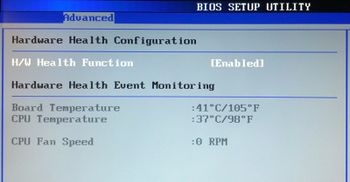Low Energy Server Temperature Sensors
| Please note that this article / this category refers either on older software / hardware components or is no longer maintained for other reasons. This page is no longer updated and is purely for reference purposes still here in the archive available. |
|---|
The Low Energy Server has two temperature sensors. The sensors can be queried in Linux by lm-sensors. The following example shows how to query the sensors in Ubuntu 12.04 LTS.
System requirements
- Low Energy Server
- Ubuntu 12.04 LTS
- lm-sensors package (can be installed using
sudo apt-get install lm-sensors)- detection of the sensors (see Sensors detection)
Sensors output
The sensors command shows the current values of the two temperature sensors:
wfischer@les:~$ sensors acpitz-virtual-0 Adapter: Virtual device temp1: +38.0°C (crit = +105.0°C) coretemp-isa-0000 Adapter: ISA adapter Core 0: +25.0°C (crit = +90.0°C)
| lmsensors Sensor | BIOS Sensor (Advanced -> Hardware Health Configuration) |
Note |
|---|---|---|
| acpitz-virtual-0 | CPU Temperature | The upper critical threshold (+105.0°C in the example) can be set in the BIOS under Advanced -> ACPI Settings -> Critical Trip Point (CPU temperature at which the OS shutds down the system) to the following values: 80, 85, 90, 95, 100, 105, 110. |
| coretemp-isa-0000 | N/A | |
| N/A | Board Temperature |
Sensors detection
To let the sensors command find the two sensors, it is necessary to detect them once by the sudo sensors-detect command.
The last question of this command (Do you want to add these lines automatically to /etc/modules? (yes/NO)) can be answered with yes:
wfischer@les:~$ sudo sensors-detect
[sudo] password for wfischer:
# sensors-detect revision 5984 (2011-07-10 21:22:53 +0200)
This program will help you determine which kernel modules you need
to load to use lm_sensors most effectively. It is generally safe
and recommended to accept the default answers to all questions,
unless you know what you're doing.
Some south bridges, CPUs or memory controllers contain embedded sensors.
Do you want to scan for them? This is totally safe. (YES/no):
Module cpuid loaded successfully.
Silicon Integrated Systems SIS5595... No
VIA VT82C686 Integrated Sensors... No
VIA VT8231 Integrated Sensors... No
AMD K8 thermal sensors... No
AMD Family 10h thermal sensors... No
AMD Family 11h thermal sensors... No
AMD Family 12h and 14h thermal sensors... No
AMD Family 15h thermal sensors... No
AMD Family 15h power sensors... No
Intel digital thermal sensor... Success!
(driver `coretemp')
Intel AMB FB-DIMM thermal sensor... No
VIA C7 thermal sensor... No
VIA Nano thermal sensor... No
Some Super I/O chips contain embedded sensors. We have to write to
standard I/O ports to probe them. This is usually safe.
Do you want to scan for Super I/O sensors? (YES/no):
Probing for Super-I/O at 0x2e/0x2f
Trying family `National Semiconductor/ITE'... No
Trying family `SMSC'... No
Trying family `VIA/Winbond/Nuvoton/Fintek'... No
Trying family `ITE'... No
Probing for Super-I/O at 0x4e/0x4f
Trying family `National Semiconductor/ITE'... No
Trying family `SMSC'... No
Trying family `VIA/Winbond/Nuvoton/Fintek'... No
Trying family `ITE'... No
Some systems (mainly servers) implement IPMI, a set of common interfaces
through which system health data may be retrieved, amongst other things.
We first try to get the information from SMBIOS. If we don't find it
there, we have to read from arbitrary I/O ports to probe for such
interfaces. This is normally safe. Do you want to scan for IPMI
interfaces? (YES/no):
Probing for `IPMI BMC KCS' at 0xca0... No
Probing for `IPMI BMC SMIC' at 0xca8... No
Some hardware monitoring chips are accessible through the ISA I/O ports.
We have to write to arbitrary I/O ports to probe them. This is usually
safe though. Yes, you do have ISA I/O ports even if you do not have any
ISA slots! Do you want to scan the ISA I/O ports? (YES/no):
Probing for `National Semiconductor LM78' at 0x290... No
Probing for `National Semiconductor LM79' at 0x290... No
Probing for `Winbond W83781D' at 0x290... No
Probing for `Winbond W83782D' at 0x290... No
Lastly, we can probe the I2C/SMBus adapters for connected hardware
monitoring devices. This is the most risky part, and while it works
reasonably well on most systems, it has been reported to cause trouble
on some systems.
Do you want to probe the I2C/SMBus adapters now? (YES/no):
Using driver `i2c-isch' for device 0000:00:1f.0: Intel SCH
Module i2c-dev loaded successfully.
Next adapter: intel drm LVDSBLC_B (i2c-0)
Do you want to scan it? (YES/no/selectively):
Next adapter: intel drm LVDSDDC_C (i2c-1)
Do you want to scan it? (YES/no/selectively):
Client found at address 0x50
Probing for `Analog Devices ADM1033'... No
Probing for `Analog Devices ADM1034'... No
Probing for `SPD EEPROM'... No
Probing for `EDID EEPROM'... No
Client found at address 0x51
Probing for `Analog Devices ADM1033'... No
Probing for `Analog Devices ADM1034'... No
Probing for `SPD EEPROM'... No
Client found at address 0x52
Probing for `Analog Devices ADM1033'... No
Probing for `Analog Devices ADM1034'... No
Probing for `SPD EEPROM'... No
Client found at address 0x53
Probing for `Analog Devices ADM1033'... No
Probing for `Analog Devices ADM1034'... No
Probing for `SPD EEPROM'... No
Next adapter: intel drm SDVOCTRL_ (i2c-2)
Do you want to scan it? (YES/no/selectively):
Now follows a summary of the probes I have just done.
Just press ENTER to continue:
Driver `coretemp':
* Chip `Intel digital thermal sensor' (confidence: 9)
To load everything that is needed, add this to /etc/modules:
#----cut here----
# Chip drivers
coretemp
#----cut here----
If you have some drivers built into your kernel, the list above will
contain too many modules. Skip the appropriate ones!
Do you want to add these lines automatically to /etc/modules? (yes/NO)yes
Successful!
Monitoring programs won't work until the needed modules are
loaded. You may want to run 'service module-init-tools start'
to load them.
Unloading i2c-dev... OK
Unloading cpuid... OK
wfischer@les:~$
|
Author: Werner Fischer Werner Fischer, working in the Knowledge Transfer team at Thomas-Krenn, completed his studies of Computer and Media Security at FH Hagenberg in Austria. He is a regular speaker at many conferences like LinuxTag, OSMC, OSDC, LinuxCon, and author for various IT magazines. In his spare time he enjoys playing the piano and training for a good result at the annual Linz marathon relay.
|
Additional Information
- Kernel driver coretemp (git.kernel.org, Kernel 3.2 documentation)


